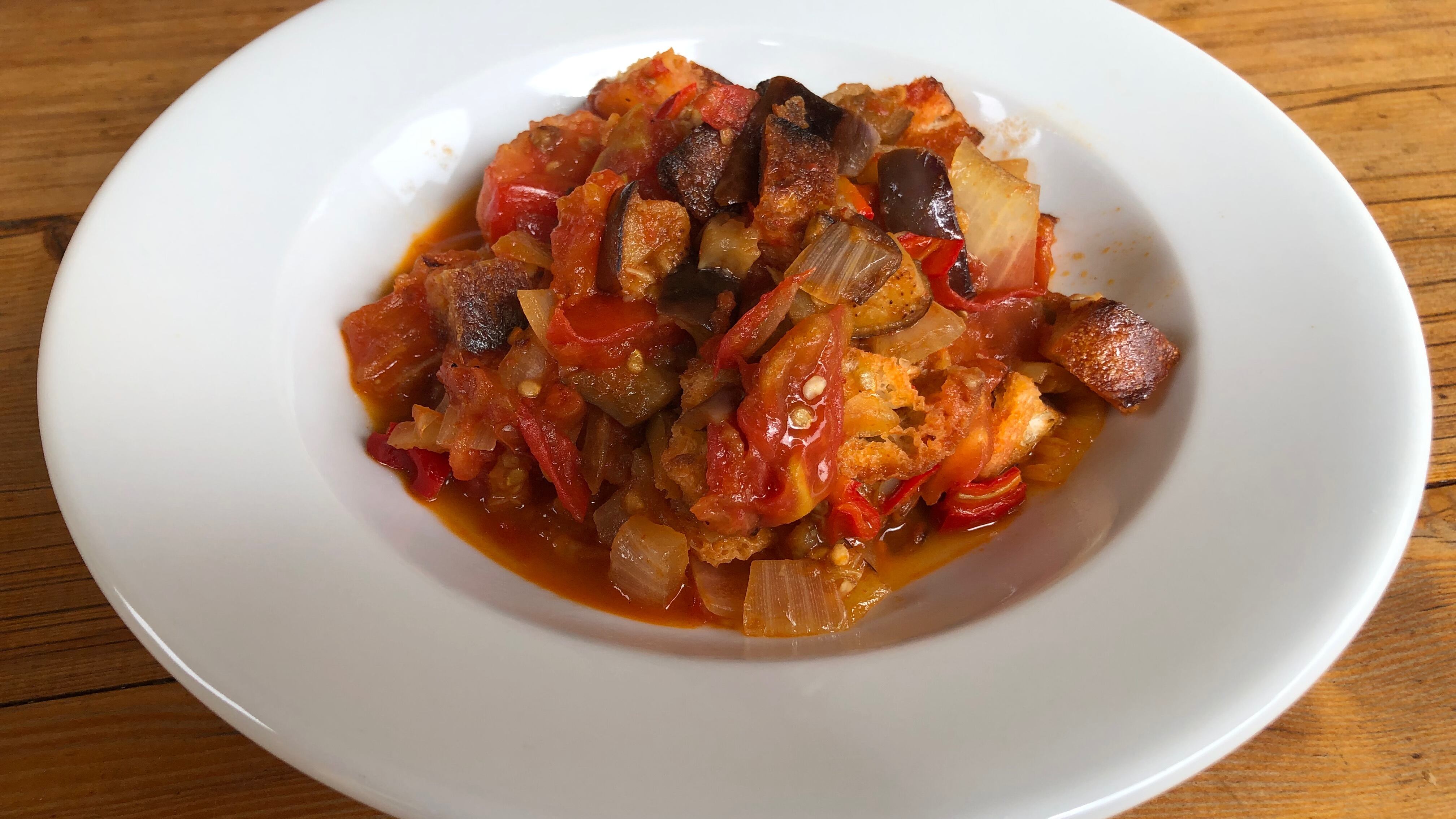Jim Dixon wrote about food for WW for more than 20 years, but these days most of his time is spent at his olive oil-focused specialty food business Wellspent Market. Jim’s always loved to eat, and he encourages his customers to cook by sending them recipes every week through his newsletter. We’re happy to have him back creating some special dishes just for WW readers.
Here on America’s left coast “migas” almost always means the Mexican or Tex-Mex version of the dish: eggs scrambled with fried strips of leftover corn tortillas, which are then flavored with chiles or salsa. But the word translates from Spanish to “crumbs,” reflecting the OG migas from the Iberian peninsula made with stale bread. Both the Old and New World migas follow the same principle of transforming a carbohydrate that’s past its prime into something different and delicious.
Inspired by Nigella Lawson’s tomato and fried bread hash from At My Table, this takes advantage of the abundance of locally grown, hot weather produce. The end of summer means lots of tomatoes, eggplants and peppers, and there’s no better time to eat as much of them as possible before the cold and gray sets in.
I’ve always liked Lawson’s straightforward, not-too-fussy approach to cooking. In a long-lost review of her first book, How to Eat, I wrote that it should be called How to Live, and it’s still a good handbook.
Nigella says her bready hash is “an excellent sop for excess alcohol, this is as good for a late supper as it is for breakfast,” so keep that in mind next time you have too much fun. Whether you get home late and need some drunk food, or you wake up the next morning feeling peckish, you can throw this together from a leftover loaf and the produce you couldn’t help buying at the farmers market.
In that spirit, what follows is more guideline than recipe. Feel free to add or subtract ingredients depending on what you’ve got. In Spain, cubes of cured sausage are crisped with the bread, and any leftover protein can be cut up and tossed in. Slide an over-easy egg on top of the migas for some runny yolk goodness, or add a few spoonfuls of cooked beans. While I like to add Spanish-style pimentón for its smoky flavor, substitute other spices and herbs if that’s what you’ve got. A splash of soy or worcestershire sauce isn’t a bad idea, either.
Late Summer Migas
2-3 slices of stale bread, cut into bite-sized pieces
1 smallish eggplant, cut into roughly 1/2-inch chunks
1-2 chiles, sweet or hot, halved and sliced
1 small onion or a couple of shallots, chopped
2-3 tomatoes, cut into chunks
Extra-virgin olive oil
1-2 teaspoons sherry, apple cider, or wine vinegar
Kosher-style sea salt
Smoked Spanish-style paprika (pimentón)
Add enough olive oil to cover the bottom of a heavy skillet and heat until it starts to shimmer. Carefully add the bread cubes and spread into a single layer. Cook over medium heat, stirring occasionally, until the bread is lightly browned on most sides. Transfer to a plate or bowl and set aside.
Add more olive oil to the skillet and heat over medium-high for a minute or two. Add the eggplant, spread it out, and let cook undisturbed for at least a few minutes. Then use a metal spatula to turn and stir, reducing the heat if the oil begins to smoke. Keep this up for about 10-15 minutes, or until the eggplant loses its white, opaque color and becomes translucent.
Add the onion and chiles to the eggplant along with a healthy pinch of salt, reduce the heat to medium, and cook for another 10-15 minutes or so until the vegetables soften and begin to brown. Add the tomatoes and cook until they collapse, maybe another 10 minutes. Add the reserved bread and pimentón and stir to combine. Add the vinegar, stir well, and remove from the heat. Serve warm.

